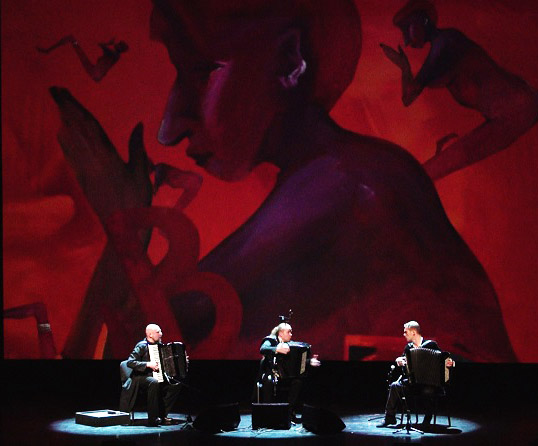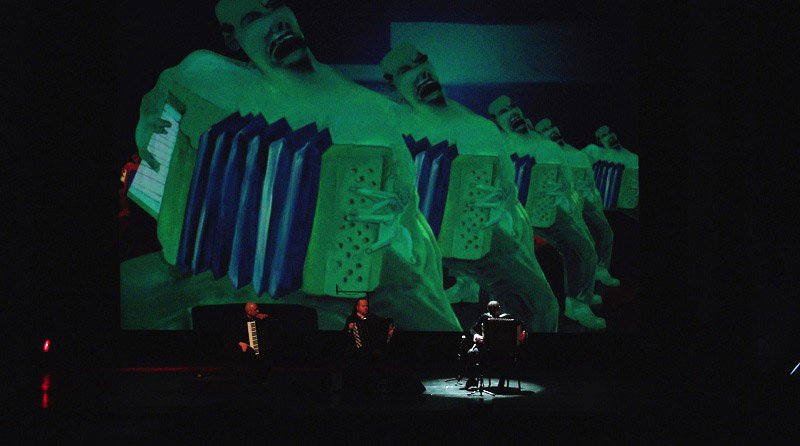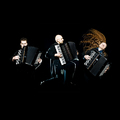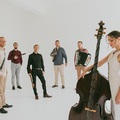
Your father, who was an accordion teacher, had the idea for the accordion trio. Back then, you played with your siblings. Later, in 1996, you founded Motion Trio, where there are also three accordionists on stage. What was the journey like from your father's idea to worldwide fame?
Yes, my father was a wonderful accordion teacher and when we were in primary school, he founded our family accordion trio - the Wojtarowicz Family Trio - where I played with my sister Jolanta and brother Tomasz. We achieved many successes as a children's and then youth team. I believe that this family band is the progenitor of the current Motion Trio and is a direct continuation of my father's idea. Previously, he composed and arranged songs for us, now it's mainly me who does it in MT, but of course each of the motion members also composes and arranges for MT.
Your work has been praised by masters such as Michael Nyman, Jerzy Maksymiuk, Krzysztof Penderecki, Bobby McFerrin, and Joe Zawinul. Such recognition might make many feel overwhelmed. How did you receive this feedback and the invitations to collaborate?
It is a great honor for us to have been able to cooperate with such great musical personalities. All these meetings had a unique character. Some were funny, some were serious, but they always taught us great lessons - they taught us love for music and respect for the audience and the organizers.
The press simplistically defines Motion Trio as "a fusion of contemporary music, jazz, rock, and folk." However, you refer to your music as "moving music." What does this mean?
Motion means movement - we are constantly in motion, and the genres of music around which we revolve - a kind of cross over - a cross-section from classical, through rock, jazz, world, give us the opportunity to create music full of life, emotions and energy. We do not play static, esoteric or excessively meditative music.
Motion Trio captivates listeners, even encouraging them to dance, which is typically characteristic of folk music. You also draw from authentic music. How closely do you follow the situation of Central European folk music, and what are your thoughts on world music?
Everything comes from something, we often emphasize our enthusiasm for "occasional" music played on the accordion: dance music, wedding music, especially that comes from the 20th century. This use of the accordion proves its ability to express emotions and feelings, and this is very close to us. We often use elements of folk in our music in an evolutionary, very natural way. For over 25 years of playing and creating together, many songs inspired by folklore have been created. Our music contains Balkan, Hungarian, Eastern and, of course, Polish influences - several songs will be played at our concert during Kandela Fesztival.

In one interview with you, you mentioned that Motion Trio's music is like the months and seasons of the year. We are now on the verge of spring and summer. Does this reflect in the mood of Motion Trio's
music?
Of course it is. This somewhat poetic metaphor reflects our natural way of approaching music. The overall mood can be compared to the outfit. We dress differently in autumn and winter spring or summer. When playing classical music, we try to best reflect the idea of the master composer - this requires great concentration, work on the craft and discipline. We feel more free and cheerful during concerts where we play our own music, created from our emotions, passion and sensitivity. And this is the music and atmosphere we will present during the festival.
You don't use any other instruments or electronics in your albums or concerts. Can everything be expressed with the accordion? Are there infinite possibilities in the instrument?
The accordion has extraordinary, largely undiscovered sound possibilities. It is a great joy for us that we can count ourselves among those accordionists who are constantly looking for new, non-obvious and different accordion sounds. We really like to use percussion effects obtained by hitting the bellows, scratching, all reed glissandos, double registering, obtaining sounds by pressing several registers at once, etc. All this gives us a lot of fun and you can hear it at our concerts. I will add that we never use electronic effects or sounds. We are an acoustic band. We make our concerts louder so that a larger audience can hear them.
Although the setup allows for great improvisation, it is not the primary focus for you. Instead, the diversity and rich layering of music are what you prioritize. Does improvisation provide too narrow a space for you?
It's not that we don't improvise at all. There are extensive improvised fragments of our songs, including most of the introductions I performed, as well as rhythmic solos played by Marcin and Paweł. The fact is, however, that we are not a jazz band and improvisation is not the most important element of our music. On the other hand, we perform relatively often with jazz and jazz musicians we give the pleasure of improvisation - this was the case, among others. with Boby McFerrin and is with Leszek Możdżer.
Can you explain to laypeople how the Pigini Sirius Millenium accordion you use differs from any other accordion?
Our Pigini accordions (the instruments were donated by the Polish Ministry of Culture) are excellent. They have a beautiful sound, color and appearance, and are handmade and very durable - which is very important considering the way we play. We are very pleased with them.
At home in Krakow, you also play street music in the evenings at the corner of Florianska Street and the market square. How is this more direct encounter with the audience compared to performing on the
world's big stages?
In our case, playing on the street is a crazy, youthful adventure from years ago. It repeated itself many times, because playing was once the main source of income, mainly for me and Marcin.
Playing on the street certainly teaches you some courage - imagine that you are alone in a foreign country, city, often penniless at the beginning, you have to find a place to play and sleep. And you have to play in such a way that people want to give you money. In one word - full capitalism. Moreover, if you want to make a living from playing on the street as an artist and not a beggar, you must be convinced of your value in what you do and that what you do is really great. You should never sabotage your art and yourself as an artist.
At the Kandela Festival, which is held in an open-air museum, light painting and visuality play a significant role. The preserved values of peasant culture are displayed in light and sometimes surreal colors. Are you preparing your concert especially for this environment?
On behalf of Motion Trio, I would like to invite you to our concert - we will be happy to share with you our music, full of good energy.
In hungarian

A bejegyzés trackback címe:
Kommentek:
A hozzászólások a vonatkozó jogszabályok értelmében felhasználói tartalomnak minősülnek, értük a szolgáltatás technikai üzemeltetője semmilyen felelősséget nem vállal, azokat nem ellenőrzi. Kifogás esetén forduljon a blog szerkesztőjéhez. Részletek a Felhasználási feltételekben és az adatvédelmi tájékoztatóban.

